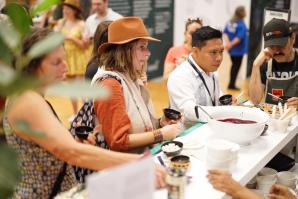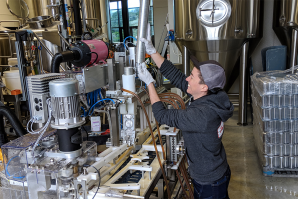Sacramento will serve as the site of a prestigious international food conference that could eventually bring thousands of tourists and millions of dollars into the region.
The conference, called Terra Madre Americas, will take place in California’s capital city every two years, starting in September 2025. It’s an offshoot of Terra Madre Salone del Gusto, a five-day conference in Turin, Italy, that attracts 350,000 people to that city.
Terra Madre, which means Mother Earth, brings together food producers, scientists, chefs and researchers to share ideas about food in relation to social justice, environment and ancestral methods of production. It’s a program of Slow Food International, a global organization that supports “good, clean and fair food for everyone,” according to its motto.
In Turin, Terra Madre is like the United Nations of food, seasoned with a dash of Olympic theatrics. It includes a parade in the city center and kicks off with more than 5,000 delegates from 160 countries marching into a big sports arena under their nations’ flags. Attendees participate in panel discussions, tastings, tours and other events focused on heritage foods and processes.
Darrell Corti, Sacramento’s famed grocer and global food expert, attended Terra Madre in 2006 and was wowed. “There is information about foods from anywhere in the world — and not just ordinary things, but special things,” he says. There, he saw a Mangalitsa pig for the first time and learned about a creamy white bean, called Mongeta del Ganxet and grown only in Catalonia, Spain, that is reputed to be the finest in the world. “The whole idea of Terra Madre is to see what Mother Earth has to offer,” he says. “Sometimes you’re absolutely amazed at the things that people still do.”
Brenda Ruiz, acting president of Slow Food’s Sacramento chapter, said attendance at Terra Madre (she was a delegate in 2014 and 2018) enables food people to make connections and learn from others from around the world. It also can open consumers’ eyes to the way their food choices affect people in other nations. “There’s a whole world out there,” she says.
Exhibits at Terra Madre focused on the roots of important foods
like sugar, wine and coffee. (Photo by Lisa Nottingham
Photography, courtesy of Visit Sacramento)

Representatives from Visit Sacramento, the city’s tourism bureau, began talking with Slow Food International in 2019 about hosting a western hemisphere version of Terra Madre that would focus on food systems in Canada, the United States, Central and South America, the Caribbean and Cuba. Plans were put on hold during the pandemic. This year, a quickly organized, truncated version of Terra Madre was held at Memorial Auditorium over three days in mid-May, with museum-style exhibitions, cooking demos, coffee and wine tastings, panel discussions and hands-on projects for kids. The event focused on five emblematic foods — corn, sugarcane, acai, quinoa and cocoa — from distinct biocultural territories in Latin America and the Caribbean.
Because the event was unticketed, organizers couldn’t provide a precise count of attendees. Mike Testa, CEO of Visit Sacramento, guesstimates about 5,000 people, most of them locals, came through Memorial Auditorium over three days, along with a delegation of about 40 representatives of Slow Food chapters in Latin America. He says the conference necessarily started small, almost as a beta test or proof of concept, but hopefully will grow to Turin’s size with time. Paolo Di Croce, director of Slow Food International in Italy, calls it “a kind of preview, a first bite.” Adds Testa: “You really just want to plant a flag in the ground.”
For Sacramento, the potential economic impact is huge. Terra Madre in Turin began similarly small in 1996 and is now one of the largest food conferences in the world. In 2018 (its last year at full strength before the pandemic), Terra Madre accounted for 30 million euros (about $32 million) in spending on hospitality (things such as hotels, restaurants and taxis) and 88 million euros (about $95 million) in value from press and media, according to Di Croce.
Beyond the euros-and-dollars impact, there is a wider and longer-lasting benefit for the host city: recognition as an international food center. According to Di Croce, Turin post-Terra Madre is a “different city from what it was 30 years ago. It is now considered a food place.” Now, tourists travel to Turin even in conference off years to see the city’s sights, eat its foods and drink its wines. He believes Sacramento, like Turin, will eventually become a “global hotspot for quality sustainable foods.”
Clearly, Testa hopes the same. He was instrumental in bringing the Michelin Guide to Sacramento and in creating the Farm-to-Fork Festival, the Tower Bridge Dinner and Sacramento’s self-designation as America’s Farm-to-Fork Capital. Terra Madre Americas is yet another foodie feather in Sacramento’s cap — and this one has a global reach.
Corti cautioned that people coming to Terra Madre expecting lots of foods to sample, like they might get at the Fancy Food Show or Sacramento’s Farm-to-Fork Festival, may be disappointed. “There is not a lot to taste at Terra Madre, but there is a lot to learn,” he says. “People have to understand it’s not an eating fest. It’s an information fest.”
At the May event in Sacramento, chefs and farmers from Mexico and Brazil gave presentations in their native languages to attendees listening on translation headsets. “Borders and language are not a problem,” says Juan Barajas, who owns Savory Cafe in Woodland and serves as president of Slow Food Yolo, which helped organize the conference. “The breakout events were at maximum capacity.”
Paolo Di Croce, right, director general of Slow Food, and Jose
Omar Rodriguez, fourth-generation Honduran coffee farmer and
general manager of Las Capucas coffee cooperative, pose near a
booth sampling coffee from Las Capucas and others. (Photo by
Becky Grunewald)

The Sacramento and Turin conferences will alternate every other year, with Sacramento taking place in the odd-numbered years and Turin in the even-numbered years. For the 2025 Sacramento conference, there are plans to bring music and outdoor venues into the mix and to invite delegates from all 80-plus Slow Food chapters in the United States. Organizers hope to really supersize the 2027 event into a full-scale, Turin-style conference, with multiple venues and bigger spaces.
It’s a challenge, but it’s also an opportunity for Sacramento to strut its stuff for the rest of the world. According to chef Brad Cecchi, two local restaurants “rolled out the red carpet” in May for visiting delegates. At an opening reception, Ella Dining Room & Bar showcased American ingredients such as sea snail roe, Czar Nikolai caviar, Berkshire pork and locally grown lettuces. For another gathering, Mulvaney’s B&L hosted its signature “family meal,” serving a spit-roasted pig from farmer John Bledsoe with local produce and ending with pistachio macaron ice cream sandwiches from Ginger Elizabeth.
According to Testa, having Terra Madre Americas on Sacramento soil every two years promises to shine “a huge culinary spotlight” on the city and the region. “The goal is to create an American version of what is so popular in Europe,” he says. “It’s an opportunity for Sacramento to become the epicenter of food in the United States, and that ultimately could change our market the way it changed Turin.”
–
Subscribe to the Comstock’s newsletter today.
Recommended For You

Vino Madre
Juicy scenes from the wine tasting room at the first Terra Madre Americas
For three days in May, the floor of the Memorial Auditorium was transformed into a global foodways classroom where one could sample coffee from Honduras, eat a cookie made from Bolivian quinoa and spin an oversized wheel that directed you to pithy sayings by food journalist Michael Pollan.

Is Tea the New Happy Hour?
These Capital Region tea rooms bring a California twist to an English tradition
Afternoon tea evokes something people have always sought — “a feeling of rarely experienced elegance and class,” Mueller says.

The Canned Craze
Canned cocktails and wines are light and easy to tote, perfect for a backyard barbecue, summer concert, picnic or anytime
The canned alcohol trend isn’t hard to spot. Just stroll through your local grocery store and you’ll see those colorfully packaged cans of prosecco and prickly pear margaritas all dressed up and ready to go, perfect for a picnic or poolside party.

The Thrill of the Ring
Sacramento’s small-town professional wrestling scene is just as colorful as the big league
The alley entrance of a warehouse behind the Broadway Taco Bell on a recent Saturday was a portal to another world. A world of drama, where fans chanted and booed lustily, the air redolent of masculine funk.



